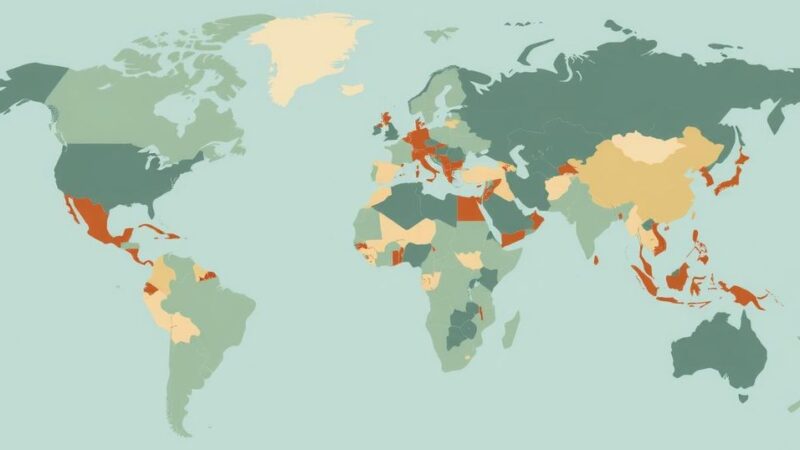The abrupt end of Bashar al-Assad’s regime in Syria has prompted a significant recalibration of diplomatic responses among GCC states, especially Oman, which maintained ties throughout the civil conflict. Oman now navigates the complexities of engaging with the newly asserted Islamist leadership while upholding its principles of non-interference and equidistant relations. The varied societal reactions to Assad’s fall illustrate a divided sentiment, with concerns over potential regional instability and the rise of extremism. Oman’s strong condemnation of Israel’s military actions signals its evolving regional stance and commitment to supporting Syria’s unity.
The removal of Bashar al-Assad and the end of the Baathist regime in Syria on December 8, 2024, took the Gulf states, particularly the members of the Gulf Cooperation Council (GCC), by surprise. As the situation evolved rapidly with HTS-led offensive actions, the Gulf monarchies began to adapt their strategies to ensure regional stability and territorial integrity, engaging with the newly established Islamist authorities in Syria. Oman, uniquely positioned within the GCC as a state that maintained ties with Assad’s regime throughout the conflict, is now navigating the complexities of this transition while striving for a balanced, pragmatic approach in its diplomatic relations.
Oman’s foreign policy has been characterized by a commitment to non-interference and equidistant relations with all Middle Eastern countries. Throughout the Syrian civil war, Muscat engaged with Assad’s government, emphasizing diplomatic solutions. This approach was exemplified by high-level visits by Omani officials to Syria, signaling a commitment to supporting Assad’s position, even as the regime faced significant internal and external challenges. However, the abrupt change in Syria’s leadership compelled Oman to recalibrate its stance, recognizing the new governing reality while maintaining a focus on Syria’s unity and stability.
Public sentiment in Oman regarding Assad’s ousting has revealed a complex tapestry of opinions. A faction within Omani society aligns with the pro-Iranian narrative, fearing that the fall of Assad signifies a broader destabilization of the Axis of Resistance against Israel. Conversely, others celebrate Assad’s removal as a victory against tyranny, believing that HTS’s leadership will usher in positive changes. Still, a third perspective reflects anxiety over the potential rise of extremist groups in Syria, resonating with liberal elites concerned about the implications of Islamist governance.
The evolving geopolitical dynamics, especially post-October 2023 with Israel’s continued military actions in Syria, have prompted a united Omani response against perceived aggression. This stance is underscored by Oman’s growing condemnation of Israel, marking a shift from previous diplomatic postures towards a more assertive articulation of regional solidarity. Amidst these developments, Oman continues to uphold its foundational policy of refraining from intervening in the internal affairs of neighboring states, aiming instead to support a peaceful resolution led by the Syrian people themselves.
Ultimately, the ramifications of Syria’s regime change extend beyond its borders, with implications for regional stability and Oman’s diplomatic relations within the GCC and beyond. As Oman positions itself amid these shifts, it remains committed to fostering an environment of dialogue and stability in the tumultuous landscape of Middle Eastern politics, adhering to its historical principles of non-interference and neighborly engagement.
The political landscape in Syria underwent a significant shift with the unexpected ousting of Bashar al-Assad after 61 years of Baathist rule. This event caught many in the Gulf states off guard, particularly the GCC, which had not anticipated such a rapid succession of events leading to the regime change. Oman’s reaction is noteworthy as it maintains a unique position in the Gulf, having never fully severed diplomatic ties with Assad’s regime during the civil conflict, and now faces the challenge of engaging with the new Islamist leadership while ensuring regional stability and its non-intrusive foreign policy.
In summary, the sudden regime change in Syria has prompted Oman to reassess its diplomatic strategy while navigating complex public sentiments regarding the implications of Assad’s ouster. The Sultanate’s longstanding commitment to equidistant relations and non-interference positions it favorably to mediate and facilitate stability in a volatile region. Oman’s evolving stance on Israel and dedication to respecting Syria’s territorial integrity reflects its ongoing quest for peace amid the shifting dynamics within the Arab world. As Syria continues its transition, Oman remains vigilant, emphasizing constructive engagement to support a viable path forward for its neighbor.
Original Source: arabcenterdc.org






